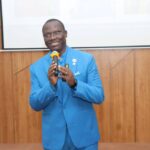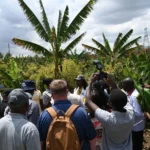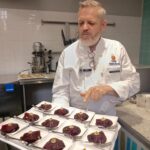By Tebby Otieno I tebbyotieno62@gmail.com
As the MESHA Fifth African Conference of Science Journalists drew to a close last Friday, many things kept crossing my mind.
First, it must take a strike of some genius to organize such a big conference. The amount of work that goes on in the preparation of this conference must be enormous laced with a lot of hard work, I suppose.
The manner in which the themes were arranged to fit in snugly into four days, with the first day being set aside for health, the second day dedicated to agriculture, with environment, biodiversity and climate change being the main concern on day 3 – struck me with awe.
Issues of what we do – reporting science journalism – fitted in snugly on day 4 – the last day of the Conference. This excellent, meticulous arrangement and planning only comes from experienced conference directors. I found this approach stimulating, enriching and professional. So logical were the presentations that as a first time attendee, I felt nothing but joy. When the conference began, within the first three presentations, my fear, mixed with anxiety, quickly evaporated, leaving me in the realization that this was a Conference of note. So, as they say, I sat back, listened and enjoyed.
At exactly 1am each subsequent night, we received the day’s conference bulletin! What a surprise! With barely any resources, the Secretariat managed to put together this daily publication with the alacrity of the Korean Sword! Whatever magic our Secretary, Aghan Daniel uses on his team to put up such an out of the world show, remains a mystery for me and perhaps to many MESHA members.
Wait a minute. And so where did the International Federation of Agriculture Journalists emerge from to make such scintillating opening remarks at the beginning of the conference! This is yet another aspect that has left me in awe! The opening ceremony had three speakers, – our own MESHA Chairman, Mr Bozo Jenje, a representative of InfoNile, our partners in the Conference, Alis Okonji and Lena Johansson, the President of ifaj. She shed a lot of light on the Federation and stated that human rights and freedom of speech were key tenets in promoting science journalism.
The keynote speech, from Dr Samuel Oti left me thinking – how can I contribute towards decolonizing health rights and funding for my own African brothers and sisters?
The day of health…..mine. This was a gem. An experts spoke eloquently on how much hope there was in the introduction of the vaginal ring in the intervention against HIV that left me wondering – have all women of Africa heard of this ring? Then came the presentation on U=U by Dr Lazarus Momanyi, a Ministry of Health official. U=U basically means undetectable is equal to untransmittable. Good enough, I now know that adherence is key in wrestling HIV/AIDS. I asked our Conference Director, Nduta Waweru why they had to bring a science café into the conference and her answer was…..”Our funders, AVAC, okayed our request for this session, adding that it is rewarding to once in a while meet other journalists who ordinarily do not attend the cafes.”
I also noticed that this year, there were more than 5 sessions on biodiversity. Why the prominence to this branch of conservation? The organisers told me that since February, MESHA received funds from JRS Biodiversity Foundation to do a project called Journalists Acting for Biodiversity (JAB). This support enabled the invitation of four scientists to talk about biodiversity at the Conference.
Sessions on agriculture were mouth-watering. That there are 500 species of edible insects in Kenya was an amazing fact that has convinced me now to believe that insects have a big role to play in food security in Africa. From the agriculture session, I picked the knowledge that I need not worry about Genetically Modified Organisms since our endemic species are intact – in fact they are kept in a gene bank! And very country has its own genebank.
It was also cool to note that there is a fallacy about so called farmer saved seeds, as our farmers do plan what is called grain and not seed. Where are all these seed people been? I have kept on wondering. That there are regulations that seek to ensure that we do seed business harmoniously within the economic blocs. Even though I am an avid reader, I have decided that I will read even more. How come I have all along not known that there are continental guidelines the use of Biotechnology for food and agriculture? Thanks to the Conference now I know. It was gratifying to hear Dr Simplice Nonou, Head of Agriculture and Food Security at the African Union Commission talk about biotech in Africa and led us as journalists into understanding what is happening in Africa as a whole.
It was a brilliant idea to bring science journalists to share with us their experiences in covering climate change. I learnt a lot and will practice what I heard other journalists across the borders do.
Callings on African governments and international agencies
If any event needs funding from agencies, the UN body, African Union, large and international NGOs, the Kenya Government etc – that event is the MESHA Fifth African Conference of Science Journalists.
This Conference holds the future for African science and should hence be made BIG. It is that single event that provides a forum to showcase science being done in Africa. It is that gathering that acts as a single market where all the science done in Africa yearly can be brought together and presented to the masses – devoid of jargon.
My take is that the Conference is that a must attend event by all who work in the space of science. It will require attendance from each of the 54 African countries, it can be our heritage where the West come to listen to us as they savour our science.
I call on the industry players, producers of goods and services in Africa to come out and support the Conference. This conference can no longer remain low keyed. It must attract the high and the mighty!
Come on people of Africa and put money in this Conference.






